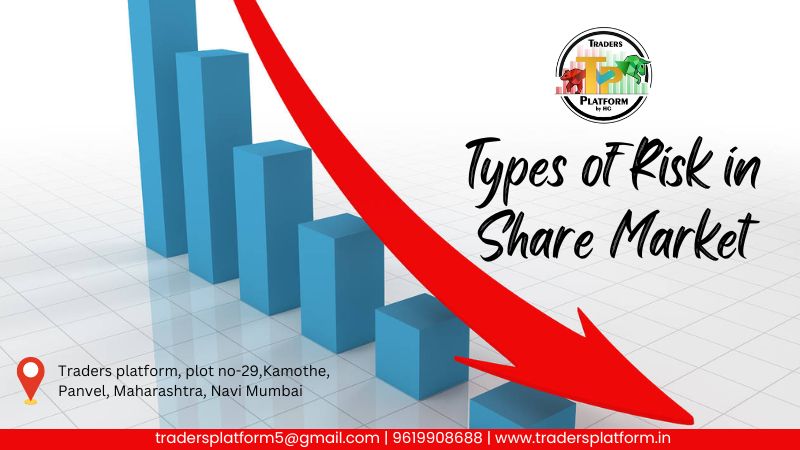- Home
- Blog
Types of Risk in Share Market

Stock market investing can give you the best returns but it carries a certain amount of risk. You are totally mistaken if you believe that buying stocks is as safe as keeping cash or a bank account. Understanding the numerous stock market risks that could impact your investment is essential, regardless of whether you are an experienced investor or a beginner looking for an opportunity to try your hand at investing in the share market. It’s possible that you can reduce the risk in share market or at some level have a backup plan if you are aware of it. Let’s explore different types of risk associated with stocks in this blog, which you should be aware of.
Types of Risk in Share Market
Market Risk
This is also known as systematic risk and is predicated on the market’s daily price fluctuations. Sensex and Nifty, two market indices, fluctuate in value during the day. It frequently has an impact on a stock’s results as well. For instance, the prices of even some excellent stocks may decline if the market is declining at a given moment. Furthermore, compared to the long run, market risks are higher in the short term.
Business Risk
This is also known as unsystematic risk, and it has the potential to worsen if business is struggling. Business risk can arise from a variety of factors, such as bad managerial performance, inconsistent quarterly results, market conditions, or poor firm selection. To a certain extent, you may reduce unsystematic risk by diversifying your portfolio by purchasing shares of other companies and industries.
Liquidity Risk
When you cannot buy or sell your investment quickly enough, liquidity risk appears. You should always check the company’s liquidity before purchasing any shares. Paying bills can be difficult for businesses with large debt loads. There’s a high probability that they will reduce their dividend payouts or, in the worst situation, declare bankruptcy. All companies have risks related to liquidity.
Inflation Risk
The risk that the cash flow from an investment may eventually lose value in future due to decrease in the value of its purchase as a result of inflation, also referred to as purchasing power risk. Almost every investment types carry some level of inflation risk.
Taxability Risk
Since the government alters taxes frequently, the industry in which you invested may see an increase or drop in taxes. The stock price may be impacted by changes in taxation.
Volatility Risk
When a company’s price varies over time, volatility risk appears. To reduce volatility risk, you should consider price stability, traded volumes, recent price swings, and other factors.
Regulatory Risk
Many regulations that are enforced across various companies must also be considered part of the risk associated with stock market. For instance, the profit and stock price of a pharmaceutical company will undoubtedly be impacted if it loses any of its production rights or permit due to regulatory action.
Currency and Exchange Rate Risk
It is the potential risk of financial loss brought on by volatile foreign exchange rates. When you invest in foreign currency or foreign currency-traded products, you run the risk of experiencing this.
It is crucial to keep in mind that there is no guarantee of a risk-free return, hence risk management in stock market should be a key consideration when making an investment. However, those who take “smart” calculated risks are rewarded in the stock market.
We at Traders Platform are committed to provide you easy access to our course offerings, and we’ve positioned our branches to better serve you. Explore our branch network below to find the one closest to you
Contact Us
tradersplatform5@gmail.com
Make a Call
+91-9619908688
